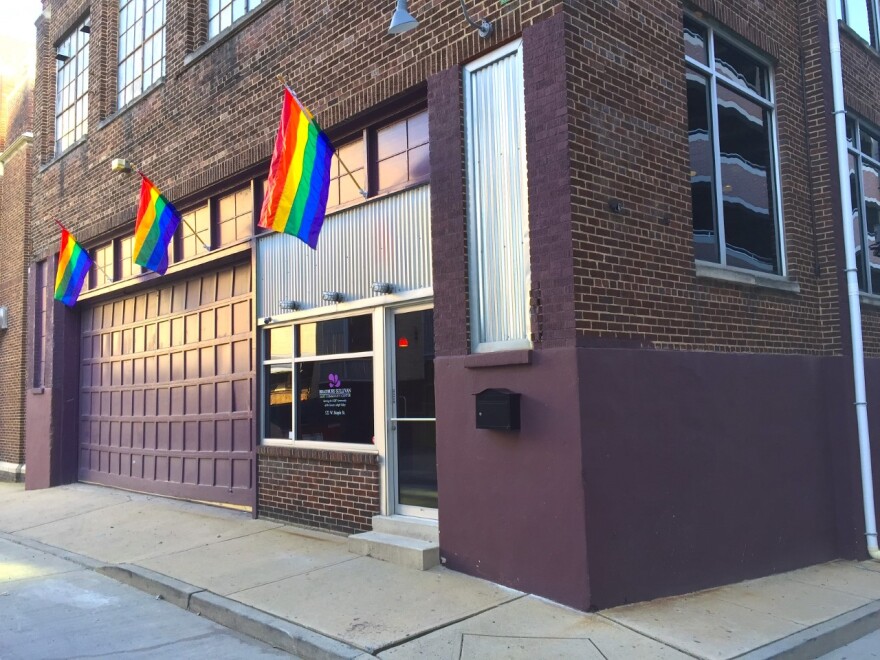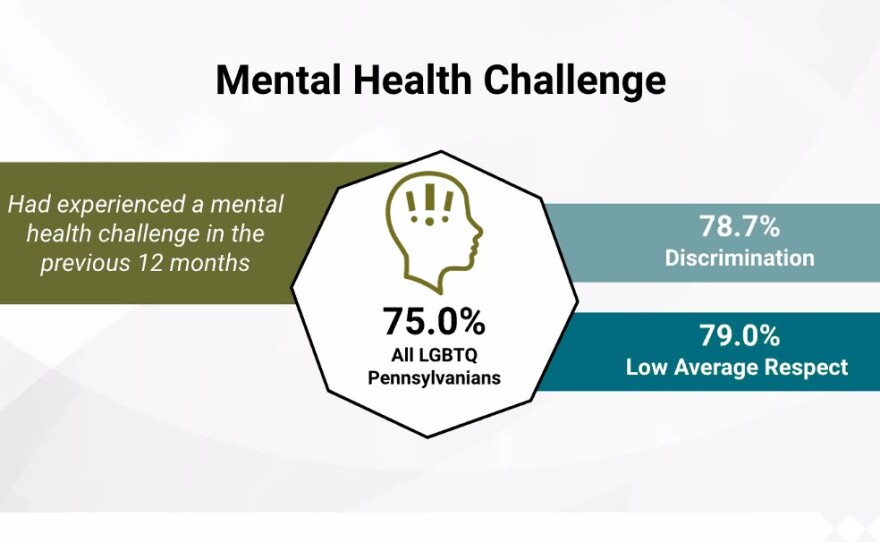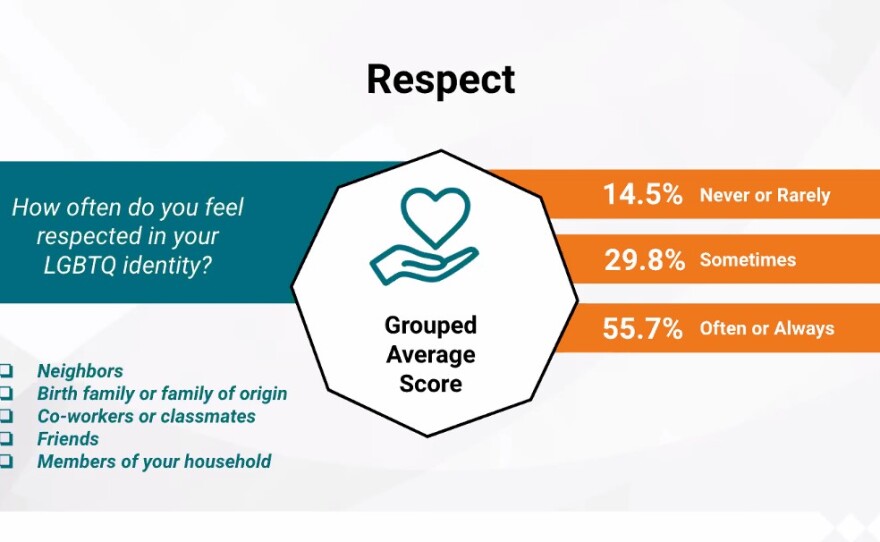ALLENTOWN, Pa. — LGBTQ people are more likely to experience mental health challenges and less likely to get the social and emotional support they need, according to a state health needs assessment.
May is Mental Health Awareness Month, and Bradbury-Sullivan LGBT Community Center is spotlighting how different communities face different mental health challenges.
The center last week held a virtual event about the state of mental health in the LGBTQ community.
- LGBTQ people are more likely to experience mental health challenges and less likely to receive the social and emotional support they need, according to the 2022 Pennsylvania LGBTQ Health Needs Assessment
- Bradbury-Sullivan LGBT Community Center collaborated with other organizations across the state to collect and interpret the data from the assessment
- The center hosted a virtual event about the state of mental health in the LGBTQ community
The presentation featured data from the 2022 Pennsylvania LGBTQ Health Needs Assessment, a biannual survey that evaluates health needs and disparities among LGBTQ people in the state.
Bradbury-Sullivan Center collaborated with other organizations across the state to collect and interpret the data from the assessment.
The center's Data & Evaluation Manager Christina Graham said she takes the data from the assessment and provides reports to their collaborators to help highlight key needs in their communities.
“Mental health has risen to the top of that list every time we've done this survey,” Graham said.
The May 10 event was the third of a series of presentations, together called the 2023 PA LGBTQIA Health Summit.
The last event in the series will be held on June 21 and be about LGBTQ-focused efforts of tobacco cessation.
Comparable data
Graham compared results from the 2022 PA LGBTQ Health Needs assessment to other nationwide surveys to highlight disparities between the LGBTQ community and the general population.
The LGBTQ assessment found 74% of adult respondents had experienced a mental health challenge in the previous year.
About 23% of all U.S. adults had a mental illness or health condition in the previous year, according to a survey administered by the Substance Abuse and Mental Health Services Administration, or SAMHSA.
SAMHSA data from 2021 shows that 4.8% of U.S. adults had serious thoughts of suicide in the past year, as did 12.7% of youth ages 12 to 17.
About half of the adult respondents to the LGBTQ assessment had ever had thoughts of suicide, as did 43% of respondents ages 13 to 17.
The question in the LGBTQ assessment was phrased as “ever,” rather than “in the past year,” which could partially explain the discrepancy, but Graham said the numbers still are concerning.
“This [percentage] is extremely high, and something that I think both medical providers and community-based organizations need to be aware of,” Graham said.
A little over three-quarters of adults in the United States always or usually received the social and emotional support they needed, according to a National Center for Health Statistics report from October 2021.
That was true for only 43% of adult respondents to the LGBTQ assessment.
Other data
More than half of respondents often or always feel respected in their LGBTQ identities, and 14.5% never or rarely feel respected, the study found.
Graham said respondents of color and transgender and nonbinary respondents were less likely to be respected.
About 62% of respondents have experienced discrimination based on their LGBTQ identity, the study found.
About a third of all respondents reported often or always lacking companionship and feeling left out. A little over a third of respondents reported often or always feeling isolated.
The assessment also asked about potential barriers to accessing mental health care services. About 45% of respondents face at least one barrier to care, including fear of negative reactions, a lack of insurance coverage and the inability to find providers.
What can be done
Graham described peer support groups such as the ones Bradbury-Sullivan Center holds as “disruptors” to the mental health challenges LGBTQ people can face.
“Interfering early, giving especially young folks a place of connection, of community, of joy, is really important, because they are really resilient,” Graham said. “And given those tools, they have much better health outcomes overall.”
The keynote speaker for the event was Rahim Thawer, a social worker, psychotherapist and sessional lecturer at the University of Toronto.
Thawer spoke about how LGBTQ people’s mental health challenges often manifest differently because they live in different social contexts than cisgender heterosexual people, which is important for health care providers to know.
“Just like my straight counterpart could struggle with depression, I might also have depression," Thawer said. "So we might have the same label."
“But what determines our experience of depression? And how does our depression express itself?”
You are part of those groups, you are someone's neighbor, you're someone's family, you're someone's coworker, and how you treat them matters.Christina Graham, Data & Evaluation Manager for Bradbury-Sullivan LGBT Community Center
Graham also encouraged people to think about how the way they treat their LGBTQ friends, coworkers and community members could affect them.
“You are part of those groups, you are someone's neighbor, you're someone's family, you're someone's coworker, and how you treat them matters,” Graham said.
“Having the knowledge and the skills to support people, outside of their homes, in the community, in their workplaces, is really important.”
About the assessment
The Pennsylvania LGBTQ Health Needs Assessment collects data on health care experiences, nutrition, exercise, tobacco use, drug and alcohol use, sexual health, mental health and food and housing security.
It is funded by the state Health Department.
More than 30 LGBTQ organizations across the state worked to promote participation in the survey, and others helped without being official partners, Graham said.
Graham said she can send community organizations the raw data so they can interpret it in ways useful to them.
The full statewide report can be found on the Bradbury-Sullivan Center site.
Those struggling with thoughts of suicide can call the National Suicide Hotline at 988 or the Trevor Project, a suicide prevention organization for LGBTQ youth, at 1-866-488-7386.









